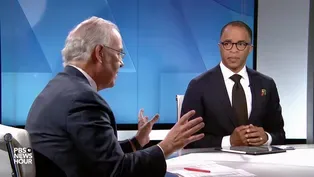
States fail to reach agreement on cutting water consumption
Clip: 2/3/2023 | 5m 31sVideo has Closed Captions
Western states that rely on Colorado River fail to reach agreement on cutting consumption
This was an important week in the battle out west over water use. Seven states along the Colorado River basin were supposed to reach a collective agreement on how to use less water from an ever-shrinking river, but they failed to do so. William Brangham spoke with Rhett Larson for our series on water issues, Tipping Point.
Problems with Closed Captions? Closed Captioning Feedback
Problems with Closed Captions? Closed Captioning Feedback
Major corporate funding for the PBS News Hour is provided by BDO, BNSF, Consumer Cellular, American Cruise Lines, and Raymond James. Funding for the PBS NewsHour Weekend is provided by...

States fail to reach agreement on cutting water consumption
Clip: 2/3/2023 | 5m 31sVideo has Closed Captions
This was an important week in the battle out west over water use. Seven states along the Colorado River basin were supposed to reach a collective agreement on how to use less water from an ever-shrinking river, but they failed to do so. William Brangham spoke with Rhett Larson for our series on water issues, Tipping Point.
Problems with Closed Captions? Closed Captioning Feedback
How to Watch PBS News Hour
PBS News Hour is available to stream on pbs.org and the free PBS App, available on iPhone, Apple TV, Android TV, Android smartphones, Amazon Fire TV, Amazon Fire Tablet, Roku, Samsung Smart TV, and Vizio.
Providing Support for PBS.org
Learn Moreabout PBS online sponsorshipGEOFF BENNETT: This was a major week in the battle out West over water use.
Seven states along the Colorado River Basin were supposed to have reached a collective agreement on how to use less water from an ever-shrinking river.
But they failed to do so.
Six states reached a modest agreement, but it would have required major cuts in water use by California, which is the largest user.
California, for its part, submitted its own proposal.
But that stalemate may force the federal government to make difficult cuts instead.
William Brangham has more for our occasional series on water issues called Tipping Point.
WILLIAM BRANGHAM: Geoff, the central issue here is that the amount of water flowing down the Colorado River is shrinking, while the demand for that water by those states is growing.
A megadrought compounded by climate change is directly at odds with the thirsty cities and farms of the American West.
The water of the Colorado River is collected in the country's two biggest reservoirs, Lake Mead and Lake Powell.
And those lakes are now three-quarters empty.
The Biden administration asked those seven states to cut their collective withdrawal from the Colorado by about a third.
But we are a long way from getting there.
For more on all of this, I'm joined by Rhett Larson.
He's a water rights professor at Arizona State University.
Rhett Larson, so good to have you on the "NewsHour."
Could you just elaborate a little bit?
You -- I laid out what seems to be the essential issue here.
Is that -- what would you add to that?
RHETT LARSON, Arizona State University: Well, what we're going through right now is a little bit like a bankruptcy proceeding.
It's like the river declaring bankruptcy.
From the very beginning of the way that the states had shared the Colorado River, we had made assumptions about how much the river could pay out in any given year.
Those assumptions that were made, now a century ago, were wrong.
And we're paying the price for those incorrect assumptions.
Now, those assumptions were wrong both because the data was bad 100 years ago.
It's also wrong because the population has obviously changed a lot.
And it's wrong because the climate has changed quite a bit.
So, even though we're getting around 90 percent of our normal snowpack and precipitation, our winters are so short and they're so hot, that a lot of that water just isn't reaching the river.
So this combination of factors has caused what is something like a bankruptcy proceeding, where you have lots of people who have a claim to a common resource, and the resource just can't pay out to everyone who has a claim to it.
WILLIAM BRANGHAM: So those seven states were supposed to come up with a plan.
Six of them did come up with a plan, not including California.
The six states that did submit a plan relied a lot on the issue of evaporation in their argument.
Can you succinctly explain what they were arguing?
RHETT LARSON: Sure.
So it's -- you mentioned having too many straws in the river or too many users.
Well, there's a user that we have never really accounted for.
And that user is the atmosphere.
The atmosphere takes away about 1.5 million acre feet away from the lower basin of the Colorado River every year.
But we don't treat that as if it's a use that's being taken out of the river.
So, part of the proposal of those six basin states is, let's just treat that 1.5 million acre feet like it's a user taking that amount of water out, and we will just spread those cuts out amongst everyone who is using the river.
Now, the way to spread those cuts out is complicated, but probably best that the people who have to move the water the farthest are the people who have to take the biggest cuts, because they're moving through canals that are open to the air, and they're losing the most water to evaporation.
WILLIAM BRANGHAM: So, what is California arguing in this?
It's the biggest user by far, principally California agriculture.
And it's the longest owner of those rights.
What are they arguing?
RHETT LARSON: Well, we have been through a series of negotiations in the last several years about how to share in shortage.
But, for decades, California has had what is senior priority.
So, in the Western United States, we operate under a prior appropriation regime, the first in time, the first in right.
California, for a host of reasons, sits at or near the front of the line when it comes to those water uses.
So California's argument is, we have senior priority.
We are the first user with legal rights.
So we shouldn't have to take cuts first.
WILLIAM BRANGHAM: Amidst all of this haggling in a shrinking river, and there's this issue of what's called dead pool.
Can you explain what dead pool is and what would happen if we hit that point?
RHETT LARSON: Dead pool is the point at which the reservoir levels have sunk so low that we can't take water out of the reservoir anymore.
So, effectively, we're no longer regulating the river with a dam.
It just becomes a run of the river, meaning the river is just flowing and there's no storage.
The -- when you talk about California's power, its political power, its economic power, its legal power, you might ask, why would they ever make a compromise?
Why would they ever compromise?
Part of that is the risk of dead pool is so real and its risk is so imminent within the next couple of years.
And dead pool would affect all of us, that it is in everyone's best interest, all the basin states to come up with a solution, because dead pool is a legitimate risk within the next couple of years if we don't act soon.
WILLIAM BRANGHAM: All right, Rhett Larson at Arizona State University, thank you so much.
RHETT LARSON: My pleasure.
Thank you.
Brooks and Capehart on the 2024 race for the White House
Video has Closed Captions
Clip: 2/3/2023 | 10m 37s | Brooks and Capehart on the state of the 2024 race for the White House (10m 37s)
Centers created along border of state banning abortion
Video has Closed Captions
Clip: 2/3/2023 | 3m 53s | Abortion providers create mobile centers along border of state banning procedures (3m 53s)
Chinese surveillance balloon over U.S. raises tensions
Video has Closed Captions
Clip: 2/3/2023 | 3m 29s | Chinese surveillance balloon over U.S. raises tensions in already strained relationship (3m 29s)
Global music fest helps musicians reach larger audiences
Video has Closed Captions
Clip: 2/3/2023 | 7m 11s | How a global music festival helps international musicians reach larger audiences (7m 11s)
Hiring surges, trends show men dropping out of labor force
Video has Closed Captions
Clip: 2/3/2023 | 6m 40s | Hiring surges but trends show more working-age men dropping out of labor force (6m 40s)
House committee leaders discuss U.S.-China tensions
Video has Closed Captions
Clip: 2/3/2023 | 9m 43s | House committee leaders discuss surveillance balloon, U.S.-China tensions (9m 43s)
Providing Support for PBS.org
Learn Moreabout PBS online sponsorshipSupport for PBS provided by:
Major corporate funding for the PBS News Hour is provided by BDO, BNSF, Consumer Cellular, American Cruise Lines, and Raymond James. Funding for the PBS NewsHour Weekend is provided by...

















